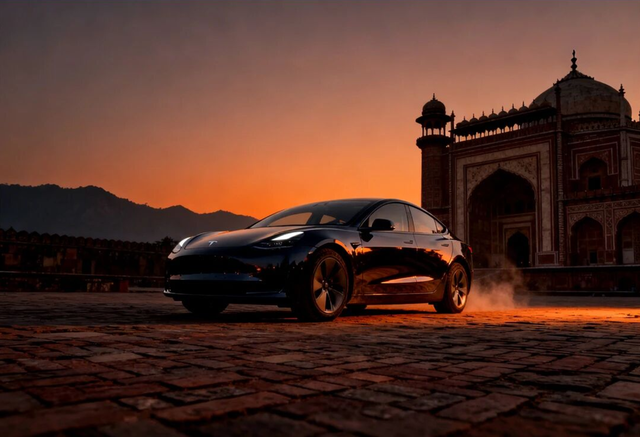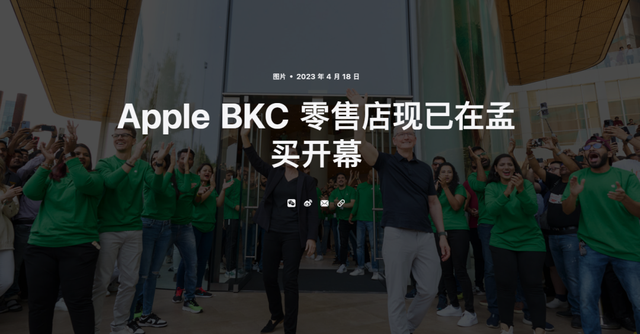Tesla Fails to Win Over India's Middle Class
![]() 10/09 2025
10/09 2025
![]() 685
685

Source: Byte
On Chinese social media platforms, Apple, Tesla, and Sam's Club are often hailed as the quintessential "middle-class trifecta." This label, which emerged during China's consumer upgrade trend, once ignited intense debates online, even leading to the suspension of some prominent social media influencers. However, when this trend tried to make its way to the South Asian subcontinent, the story unfolded in two very different ways.
Just last September, while the iPhone 17 flew off the shelves in India, with fans eagerly queuing up to snag the latest model, Tesla found itself in a rather lonely spot. In Mumbai, its showroom's Model Y, priced at nearly 500,000 RMB, managed to secure just over 600 orders, marking a rather dismal start.
In the same market, both Apple and Tesla harbored dreams of becoming the "next China," yet their fortunes diverged greatly, prompting deep introspection.
01 Apple's Investment Pays Dividends
The iPhone 17 has been a hit in India.
On September 19, the iPhone 17 series triggered a buying frenzy among Indian fans upon its release. Not only did queues stretch for hundreds of meters, but a brief scuffle also erupted outside the Apple Store in Mumbai's BKC Jio Center due to overcrowding. Security personnel eventually restored order after escorting the troublemakers away.
According to foreign media reports, Apple's annual sales in India hit a record high of nearly $9 billion in the 2025 fiscal year (ending March 31, 2025, as per Indian market practice), up about 13% from $8 billion the previous year. iPhones accounted for the majority of sales, while demand for MacBooks also saw a significant surge.
Both Apple and third-party research firms appear convinced that Apple will replicate its Chinese success story in India.
During the latest earnings call, Apple CEO Tim Cook repeatedly emphasized India's potential: "The Indian market is incredibly exciting, brimming with unbelievable energy."
Cook recalled April 18, 2023, when Mumbai's first Apple retail store opened its doors.
He personally pushed open the glass door to greet the feverish crowd outside. With cameras flashing and cheers erupting, the scene resembled Beijing's Sanlitun in 2008. At that moment, Cook may have envisioned Apple's next golden decade unfolding in India.

Screenshot from Apple's official website
The decade from 2008 to 2018 marked Apple's golden era in China. Replicating this success in India is not out of the question.
After all, India's economy is booming, with per capita disposable income showing strong growth. Wind data reveals that from 2013 to 2023, India's per capita national disposable income rose from 68,572.48 rupees (about 5,514.60 RMB) to 108,786.18 rupees (about 8,748.58 RMB), a 1.59-fold increase over 10 years, with a compound annual growth rate of about 4.72%. India's current per capita disposable income is comparable to China's in 2007, while its GDP growth aligns with China's 2013-2015 levels.
Moreover, Apple is ramping up its manufacturing presence in India. Bloomberg data indicates that as India's production capacity improves, iPhone manufacturing in India will reach $22 billion in value in the 2025 fiscal year (ending March 2025), with production volume up nearly 60% year-on-year. From April to July 2025, India's iPhone exports hit $7.5 billion.
Indian media reports that Apple has significantly expanded its Indian supply chain, with nearly 45 partners creating about 350,000 jobs.
This timeline aligns perfectly with Apple's golden era in China.
02 Tesla Faces Sales Woes
In contrast, Tesla is struggling to make inroads in India.
On September 27, Tesla VP Tao Lin announced the first deliveries of Indian-bound Model Ys, all produced at Tesla's Shanghai Gigafactory.
In July, Tesla's first Indian showroom opened in Mumbai's Bandra Kurla Complex, spanning 4,000 square feet and primarily showcasing Chinese-made Model Ys.
The Model Y starts at 5.989 million rupees (about 499,000 RMB) in India, with the long-range rear-wheel-drive version priced at 6.789 million rupees (about 566,000 RMB).
Compared to Apple's few-hundred-dollar price tags, which Indian fans can stretch to afford, Tesla's prices seem exorbitant.
Moreover, India's infrastructure appears ill-prepared for the influx of new energy vehicles.
Institutions predict that to meet its new energy vehicle goals, India needs 2.9 million public charging stations. By early 2025, India had only about 26,367 public charging stations, with a vehicle-to-station ratio of 235:1, concentrated in urban cores and highways, leaving second- and third-tier cities and rural areas underserved.
In short, India lacks the necessary electrical infrastructure, and Tesla's vehicles can't run without it.
Since mid-July, when sales began, Tesla has received just over 600 orders, far below expectations—roughly equivalent to what Tesla delivers globally every four hours in the first half of the year.
Basically, it's been a disastrous start.
But then came a rather surreal development: India, a country facing electricity shortages, began exporting power. According to India's Economic Times (ET), citing Power Minister Hardeep Singh Puri on June 10, the government signed agreements with Saudi Arabia and the UAE to export about 2 million kilowatts of electricity to each via submarine cables.
This isn't just about "delivering electricity" but a costly cross-border energy project: a 1,700-kilometer submarine cable to Saudi Arabia costing 4.7 trillion rupees, and a 1,400-kilometer cable to the UAE costing 4.35 trillion rupees. The total investment exceeds 9 trillion rupees.
Then, projects like "Stargate" that require massive electrical support are set to land in India, leaving many puzzled.
03 Musk's Unwavering Determination
Like Cook, Tesla founder Elon Musk is fixated on India.
As early as 2016, Musk planned to bring Tesla to India, but high tariffs have delayed its entry. Nevertheless, Tesla continues to persevere.
In fact, the Indian government has welcomed Tesla's local production plans. In October 2020, Indian officials invited Tesla to build a "Gigafactory India" in Bangalore.
In January 2021, Tesla registered "Tesla India Motors and Energy Private Limited" in Bangalore, with two top Indian ports vying for the factory.
However, negotiations over tariffs and other issues have stalled the plan indefinitely.
At the time, Shanghai was Musk's absolute focus. In 2019, when Tesla's stock fell below $200 and bankruptcy loomed, Chinese land, bank loans, and "China speed" enabled the construction of the Shanghai Gigafactory in just 357 days, saving Tesla from the brink. Musk himself admitted: "Without China's support, Tesla wouldn't be where it is today."
As competition intensifies in China's new energy vehicle market, India has reentered Musk's strategic vision.
From January to August this year, Tesla China sold 361,179 vehicles, down 6.9% year-on-year, with a market share of 4.8% (compared to 388,000 vehicles and a 6.5% share last year).
Meanwhile, India continues to send positive signals.
According to Counterpoint Research, India's electric vehicle sales nearly doubled in 2023 and are expected to grow 66% in 2024, reaching 4% of total passenger vehicle sales. By 2030, electric vehicles could account for nearly one-third of India's market.
Under India's Ministry of Commerce and Industry's March 2024 statement, companies investing at least 41.5 billion rupees (about 3.6 billion RMB) and starting local electric vehicle production within three years qualify for tax incentives.
"We invite global firms to India. I believe India will become a global electric vehicle hub, creating jobs and boosting trade," Commerce and Industry Minister Piyush Goyal said at a press conference after announcing the policy.
However, unlike the near-universal optimism for Apple in India, Tesla faces skepticism. As a high-infrastructure-dependent consumer good, new energy vehicles aren't seen as a sure bet in India.
Kunal Bhatia, founder of Indian venture fund AdvantEdge Founders, said Tesla's brand image has suffered due to Musk's political involvement and his dramatic shift in relations with U.S. President Trump. "Buying a Tesla used to feel like saving the climate, but not anymore." Musk's political controversies are now reflected in Tesla's sales.
With immature infrastructure and unclear regional dynamics, Tesla can only proceed cautiously.
A month after Tesla's first Mumbai showroom opened in August, the company posted job listings for autonomous vehicle operators in Delhi and Mumbai. These operators will drive engineering vehicles long distances to collect dynamic audio and camera data for testing and training purposes.
After all, based on Apple's golden decade trajectory in China, now is the time for Tesla to systematically lay its groundwork in India.
Some images sourced from the internet. Please notify us for removal if any copyright infringement exists.








